Anand's Google Nexus One Review
by Anand Lal Shimpi on April 3, 2010 3:40 AM EST- Posted in
- Smartphones
- Mobile
Experiencing the Nexus, Without Whoopie
Announced in January 2010 and just updated last month to include support for AT&T's network, this is Google's Nexus One manufactured by HTC:
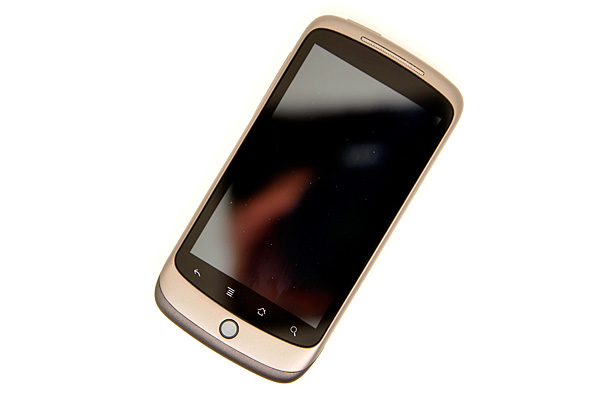
It's got a Qualcomm Snapdragon QSD8250 SoC (more on this later), 512MB LPDDR1, 512MB flash (where apps and the OS are stored), 4GB microSD card (for music/movies/photos) and boasts a 800 x 480 3.7" AMOLED screen.
The design is definitely not as cohesive as the iPhone, but here’s one area where Apple’s ID doesn’t really pay off - for a device that spends most of its life in your pocket, hand or next to your face - styling loses its value pretty quickly. The iPhone looks sleeker, but I’ll take the upgraded functionality of the Nexus One’s camera with flash any day.
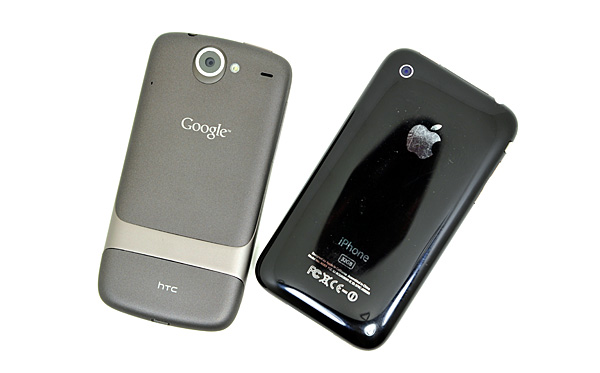
The Nexus One is narrower, thinner but longer than the iPhone. The dimensions are as follows:
| Google Nexus One vs. Apple iPhone | |||||
|
Apple iPhone 3GS (ARM Cortex A8)
|
Google Nexus One (Qualcomm Snapdragon QSD8650)
|
||||
| Height | 115 mm (4.5") | 119 mm (4.7") | |||
| Width | 62.1 mm (2.44") | 59.8 mm (2.35") | |||
| Depth | 12.3 mm (0.48") | 11.5 mm (0.45") | |||
| Weight | 133 g (4.7 oz) | 130 g (4.6 oz) | |||
The form factor is both better and worse. Making the Nexus One thinner means that it’s more comfortable to hold up to your head as a phone. You don’t succumb to the iPhone conversation fatigue nearly as quickly. The downside is that the virtual keyboard is narrower, making typing more difficult than the already painful to learn (for some) iPhone keyboard. Personally, I don’t think the tradeoff is worth it. While I believe the Nexus One’s form factor is closer to ideal for carrying around, its keyboard (in portrait mode) is worse off because of it.
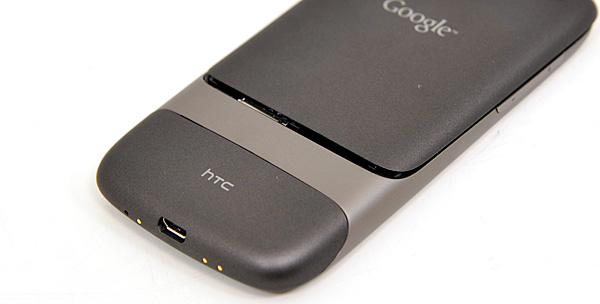
This is a normal smartphone after all, so you do get a removable battery. The back cover slides off to reveal a battery, micro SD card slot and SIM card slot. The removable battery is an important addition as you'll soon see. The Nexus One ships with a 4GB micro SD card from the factory.

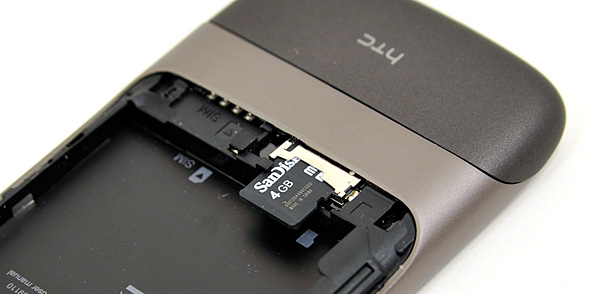
Charging is done using a micro-B USB cable. Google provides one cable, one power adapter and a set of headphones in the box. The packaging is easily comparable to anything Apple ships. Even the plastic wrap around the cables feels soft to the touch.
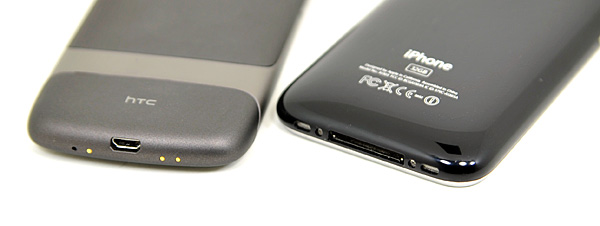
You get a standard 1/8” headphone jack up top and to the left of it is your power/lock button. Initial boot on the Nexus One does take a while, I timed it at 48 seconds (that's PC-length!).
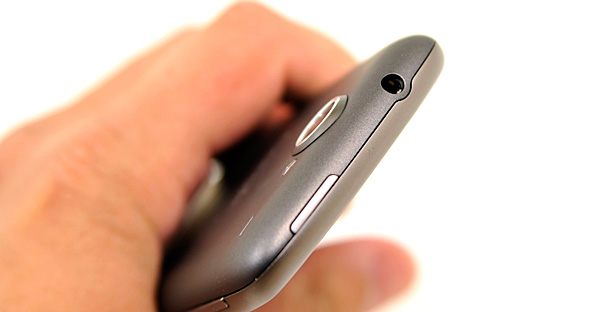
As with all other Android phones, you need a SIM and a Google account to make the Nexus One work. Simply typing in your existing Google/Gmail account works, or you can register through the phone’s interface. All syncing with the phone is done over the air and with Google’s servers.
Google doesn’t have a desktop OS (yet), and no thick client desktop apps. Rather than rely on building bridges between its smartphone OS and the desktop applications of its competitors, Google relies entirely on its cloud based services for syncing. Gmail, Google Contacts, Google Calendar, these are your new best friends. Already use all of them? Perfect - your Android phone syncs with your account and you’ll get all of your mail, contacts and calendar events immediately. If you don’t already use them then it’s a lane change. Not a difficult adjustment to make, but transitioning from desktop apps to something entirely cloud based does take some getting used to if you haven’t made the jump prior.










95 Comments
View All Comments
KaarlisK - Saturday, April 3, 2010 - link
´´The graph below shows the rough costs of simply keeping up with fab technology every two years:´´Can´t seem to find it.
deputc26 - Saturday, April 3, 2010 - link
Thanks Anand, Great Review!windywoo - Sunday, April 4, 2010 - link
Taken out of context like that, the quote sounds like it is describing a graph of smartphone prices, laptops, e-readers :) Fab tech.Nihility - Saturday, April 3, 2010 - link
I just know that after experiencing any responsiveness issues, that within a few months I'll get really frustrated with the device.I still have an iPhone 2G and I hate it. Takes forever to launch apps, browsing the web is a miserable experience and the battery life sucks. I'm definitely in the market for a better phone but I think I'll just wait for something smoother.
One of my main gripes is that my navigation app for the iPhone takes ages to load and if I get a call mid-work I'll have to restart it. Hate that.
Like Anand said, on paper the N1 is perferct but I'll let them smooth out the rough parts before I get one.
Exelius - Saturday, April 3, 2010 - link
I had the same complaint of my iPhone 3G. I bought a 3GS the day it came out and it is a huge improvement over both the 2G and 3G in responsiveness. My girlfriend has a regular 3G and much prefers using my 3GS over her own phone when browsing the web or using the Maps application.If responsiveness is a problem on the iPhone platform, get a 3GS before ditching the iPhone completely. The hardware on the 3GS is roughly equivalent to the Nexus One.
Nihility - Saturday, April 3, 2010 - link
No way. Fool me once, shame on you. Fool me twice...No more iPhones for me.
My main concern was all my apps, but most of them are available for the Android so there's nothing holding me back. I'll be glad to get rid of iTunes.
solipsism - Saturday, April 3, 2010 - link
You're comparing a phone from 2007 with an ARMv6 @400MHz w/ 128MB RAM and discounting the model that came two years later with ARMv7 @ 600MHz w/ 256MB RAM. Makes perfect sense¡KaarlisK - Saturday, April 3, 2010 - link
I love both the attention to detail and depth you have :)And I have to say that Android, not WinMo7, is the replacement for Windows Mobile 6.5 in my eyes. WinMo7 just isn´t WinMo :D
LuxZg - Sunday, April 4, 2010 - link
I agree, great review, I think I've never read anything that long about a phone :)And I agree with Android being a true Windows Mobile successor.. I don't have money for stuff like this, but if I did - I'd want all the freedom of my PC on my mobile as well. In that regard, Android seems to be the only option at the moment.
There is one thing that will clearly make lives of some people miserable.. Data rates in some countries are horrible, and smartphones all rely on mobile data connection heavily, but Nexus One is a data-hog champion by the looks of it. Hopefully, by the time I'll be able to afford phones like this one, this will be solved :)
macs - Saturday, April 3, 2010 - link
Thank you Anand, the review is great and as an owner of the Nexus One I agree with your thoughts.Android world is so wide that it's really hard to have a complete review and I think what is really missing here is something about the community around Android, XDA forum, CyanogenMOD , USB Tethering, WIFI Tethering,...